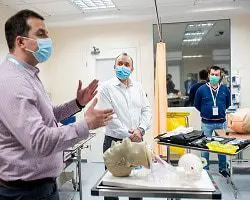Figures from the Office of the United Nations High Commissioner for Human Rights (OHCHR) show more than 4000 casualties from the war in Ukraine so far. Yet, as the OHCHR acknowledges, the actual number is likely to be far higher given that it is difficult to access accurate information from areas where intense hostilities are ongoing, and that other reports are awaiting corroboration.
Ensuring hospitals are prepared for sudden increases in casualties during this emergency is therefore crucial. A big part of this entails fully training health professionals in these institutions not just in the theory but, more importantly, in the practice of organizing and mobilizing resources to deal with these crises effectively.
Training in the Republic of Moldova
Recently, WHO at the request of the Moldovan Ministry of Health organized a 3-day course on mass casualty management (MCM), developed in collaboration with the Ministry of Health and the Karolinska Institutet in Sweden. A total of 32 surgeons, traumatologists and facility managers from 13 hospitals benefitted from the training.
The Republic of Moldova, a neighbouring country to Ukraine, has already seen 400 000 refugees cross its border for protection. Preparing its health professionals for a potential surge in war casualties has been a key consideration.
And as Ion Chesov, Head of the Integrated Services Department at the Ministry of Health, stressed, the benefits of this training go well beyond the current emergency: “We need to ensure the health system as a whole and the facilities in particular are prepared to face any emergency or unexpected disaster. Knowledge in basic and advanced trauma life support are crucial and form the foundation of medical skills in medical doctors.”
Training in Ukraine
This month, WHO also began rolling out the course in Ukraine. The first participants were staff of an ambulance substation in the Lviv region. Training paramedics in this way will allow them to provide appropriate assistance to victims even before they have reached hospitals. WHO has engaged Ukrainian emergency physicians to deliver the training, and is planning to deliver more sessions across the country.
Speaking about the course, Johan von Schreeb, WHO Emergency Medical Team Coordinator in Ukraine, commented: “In the country today, this type of training, unfortunately, is very much needed. We see a lot of mass casualty situations where many people have been injured simultaneously. That is very challenging for the health system and for the staff who have to make rapid, critical decisions for prioritizing the evacuation of the injured. Practising the triage of patients is a very useful exercise, and we need to do more of it. We can’t simply do it using presentations. You have to be exposed to the stress, the decision-making, the organization and the chaos, and we try to simulate that as much as possible through the training.”
About the course
The MCM course was developed in collaboration with WHO’s Emergency Medical Team, the Karolinska Institutet (a WHO collaborating centre) and the WHO Academy. The course developers recognized that mass casualties following disasters and significant incidents, often characterized by large numbers of severe and diverse injuries, can rapidly overwhelm the ability of health facilities to deliver adequate medical care.
The training addresses the organization and actions of staff working in emergency units, with a focus on the first 30 minutes after the announcement of a mass casualty incident. Taking a practical, hands-on approach, the training focuses on stabilizing injured patients and carrying out triage, as well as working as a team, acquiring new skills and changing ways of working. In addition, specific MCM trainings are provided to emergency staff working in hospitals.







